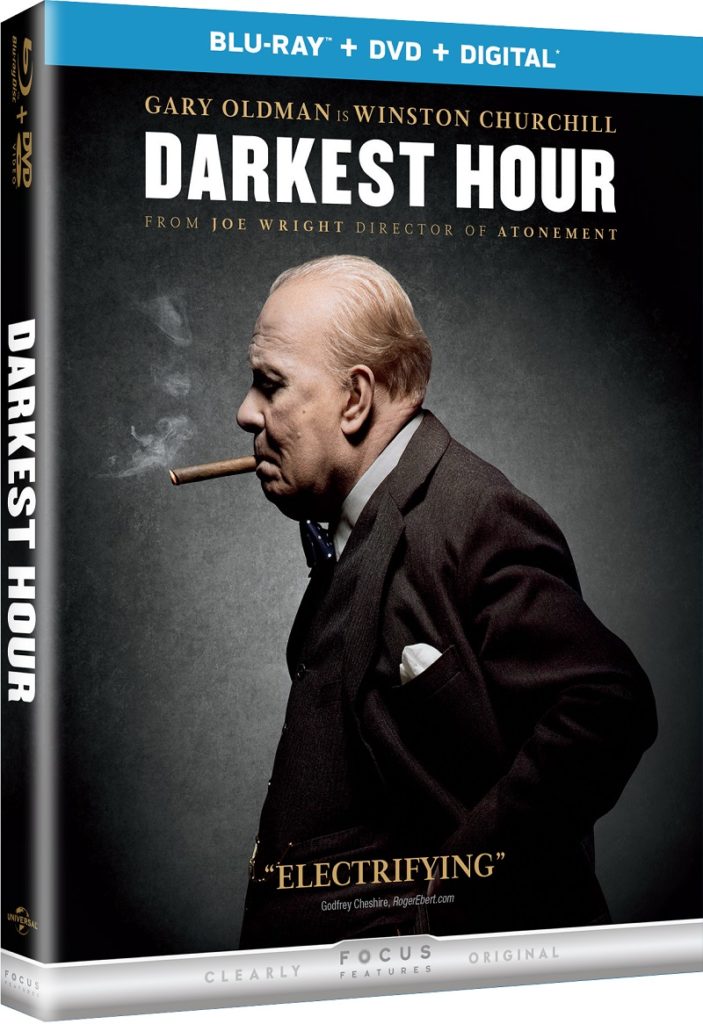One of the year’s best films, Darkest Hour, lands on home video after a triumphant run through awards season. The center of the film, Gary Oldman, turns in a career-best performance as one of the twentieth century’s most iconic figures, British PM Winston Churchill. The legendary actor won every accolade one could win for that role, culminating in the highest of high honors, the Oscar for Best Actor.
There is much to Churchill’s life that would warrant a biopic, but this film smartly focuses on his appointment to PM and how he rallied a war-weary nation to confront the evil that was knocking on their door as World War II enflamed the planet.
What is so fascinating about this time period is how the British government practically allowed Adolf Hitler and his German forces to march across Europe and take over countries along the way. It wasn’t until Nazi forces were about to topple France that Churchill was able to convince the British public that there was no time to negotiate with this tiger, as their heads “were in its mouth.”
Director Joe Wright (Atonement) expertly captures this dark period in human history. He does so in a manner that is triumphantly uplifting. It is powerful to see that when confronted with the worst that humans can produce, the good that exists in our world will (eventually) rise and challenge it with every ounce in our collective soul. There is something that is elusive to capture on film — the power that knowing when right is on our side, there is nothing that can stop us. Wright does so exceptionally.
If Darkest Hour comes off as wickedly smart and impeccably orchestrated it is because the people behind-the-scenes are as pitch perfect as the man at the center of this tour-de-force. The screenplay was penned by Oscar nominated Anthony McCarten (The Theory of Everything) and its glorious on so many fronts. Its ebbs and flows of dramatic power and emotional richness is astounding.
The supporting cast is also top-notch, from Kristen Scott Thomas’ courageous portrayal of Churchill’s better half, Clemmie, to Lily James’ stunning turn as the British leader’s secretary, who helped him forge a public persona that captured the heart of a nation. Ben Mendelsohn had a tough challenge in his own right. He was tapped to portray King George VI, a part that Colin Firth won an Oscar for in The King’s Speech. Mendelsohn gives us another side of the royal with a fresh take on a “character” audiences think they now after Firth’s Oscar winning turn.
The film was nominated for six Oscars and the other category it was victorious in is Hair and Makeup. One can see why upon witnessing the film as the transformation of Oldman into Churchill is a study in what makes movies so magical. That element is the focus of the best of the bonus features, Gary Oldman: Becoming Churchill. Sure, it is fascinating to get Oldman’s take on how he personally became the icon, but it is also fascinating to see how movie magicians turned the man we all know so well from his decades of work, into somebody who looks nothing like him. The featurette also is a lesson for those of us who have studied Churchill over the years and there is much to be gleaned from Oldman and filmmakers’ insight into the legend that was previously unknown.
Into Darkest Hour also is an entertaining and enlightening featurette that takes us behind-the-scenes into how Wright and his team captured authenticity of 1940s London, but also its heart and what made the city tick.
Lastly, as a fan of Wright’s work over the years, it was a pure joy to listen to him on the audio commentary track add layers of insight into the making of the movie, but also the history of the era. Something that is subtly captured in the film itself.
Film Grade: A
Bonus Features: B+


